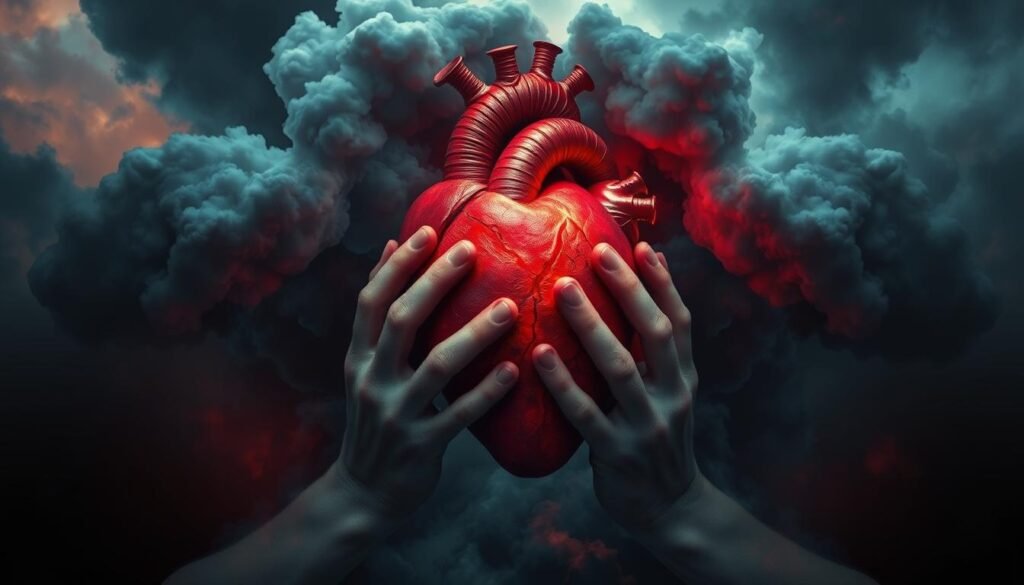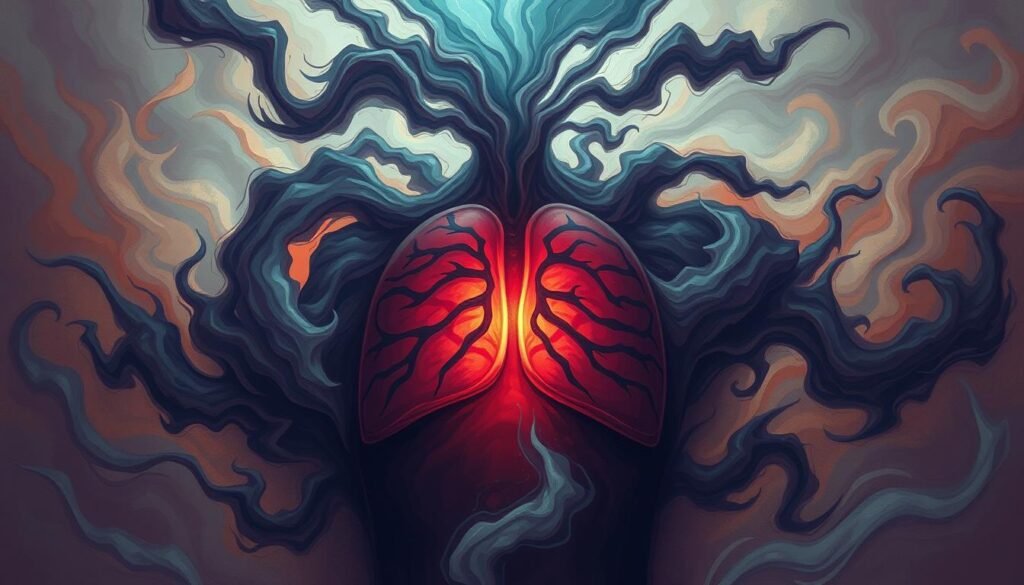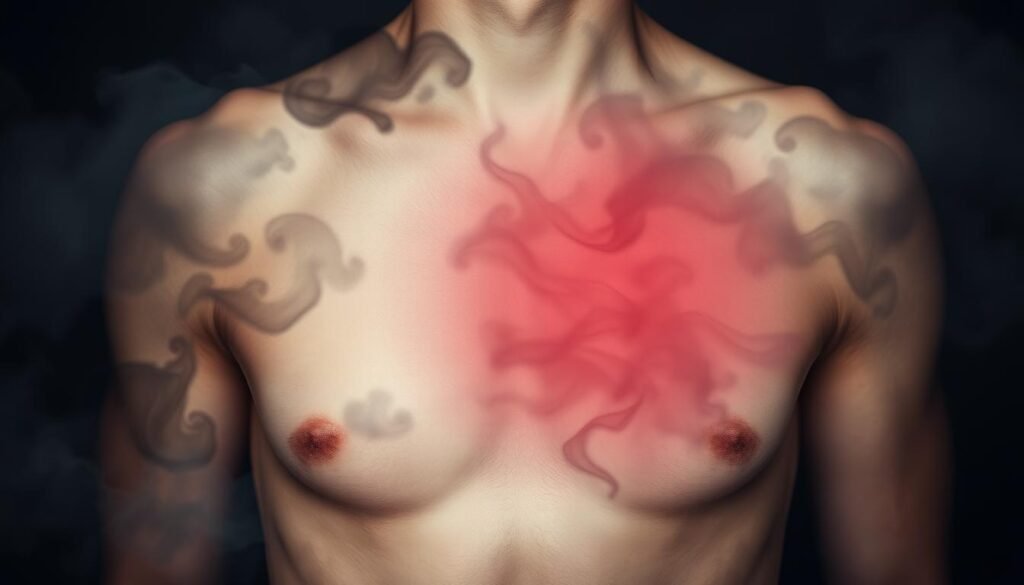Did you know almost 30% of adults face an anxiety disorder during their lives? This fact shows us how widespread anxiety is, being the most diagnosed mental health issue. Anxiety symptoms include chest tightness, which scares many. They fear it’s a heart problem. Yet, often, anxiety is what’s really causing this feeling. This piece will delve into how anxiety can cause chest tightness. We’ll learn how to tell it apart from heart issues.
Key Takeaways
- Anxiety disorders affect nearly 30% of adults at some point in their lives.
- Chest tightness is a common symptom of anxiety that can mimic heart-related issues.
- Understanding the signs of anxiety chest tightness can help alleviate fears of a heart attack.
- Effective management techniques can reduce anxiety symptoms and associated chest tightness.
- Distinguishing between anxiety-related chest tightness and cardiac pain is crucial for proper care.
Understanding Anxiety and Its Symptoms
Anxiety is our body’s way of reacting to stress. If it grows too much, it can turn into an anxiety disorder and disrupt everyday life. Estimates show that about 30% to 40% of people with low-risk chest pain in emergencies actually feel this way due to anxiety. This shows how physical problems like chest tightness can stem from emotional stress.
People with anxiety might experience a fast heartbeat, sweating, easy irritation, and feeling on edge. Chest tightness is a common sign. It can hit suddenly, feeling like a sharp pain. These intense feelings usually pass in about 10 minutes. This leaves many wondering if their pain is heart-related or just anxiety.
Getting to know anxiety helps us understand its effects on our bodies. Telling the difference between normal anxiety signs and serious medical symptoms is key. This knowledge can lead to better care and coping methods. Knowing the link between anxiety and chest tightness is important for dealing with these feelings.
What is Chest Tightness?
Chest tightness is a feeling many know well. It feels like discomfort or pressure in the chest. People may feel it as dull aches, sharp pains, or a burning sensation. Chest tightness anxiety often comes with it, especially during high anxiety moments. This can be distressing, leading some to seek medical help.
It’s important to understand what chest tightness means. Often, it’s due to muscle tension from anxiety attacks. This tension can seem like symptoms of more serious problems. That’s why knowing the difference is crucial. Surprisingly, nearly half of those with chest pain don’t have heart issues. Research shows 30-40% of chest pain cases might be anxiety, not cardiac problems. Recognizing these symptoms helps people get the right help and know when to see a doctor.
Anxiety can lead to chest tightness in several ways. When worried, our bodies release adrenaline and cortisol. These hormones make our hearts beat faster and raise blood pressure. For those with anxiety disorders, this can be constant, raising heart risks. Knowing how anxiety links to symptoms like dizziness, shortness of breath, and heart beating fast is key.
Understanding this helps in managing anxiety and chest tightness. It’s about taking steps to handle anxiety and its physical signs effectively.
Can Anxiety Cause Chest Tightness?
Anxiety is quite common and can lead to physical symptoms like chest tightness. This sensation might feel like a heart attack. It’s important to understand how anxiety and chest tightness are connected.
Relationship Between Anxiety and Chest Tightness
Does anxiety lead to chest tightness? Yes, it does. Anxiety can cause chest tightness during high stress or panic attacks. Stress hormones released in the body may cause muscle spasms in the chest. These spasms can feel like serious health issues.
The symptoms of anxiety might look like those of a heart attack. This includes trouble breathing and a fast heartbeat. Knowing the difference is key to avoid unnecessary worry and medical visits.
How Common is Anxiety-Induced Chest Tightness?
Many people experience chest tightness caused by anxiety. Studies show that 18% to 25% of emergency department visits for chest pain are related to panic disorder. The chance of feeling chest tightness from anxiety is about 22% to 70% in those with panic attacks. Understanding how common this symptom is can reduce fear and help in managing anxiety better.

Find out more about anxiety and chest pain in this article. Also, discover detailed information on anxiety’s physical symptoms at this resource.
Why Does Anxiety Cause Chest Tightness?
Anxiety often shows up with physical symptoms, including chest tightness. It’s important to know why this happens. It can make dealing with anxiety easier. The reasons behind chest tightness involve bodily reactions and hormone shifts.
Physiological Responses to Anxiety
When anxious, our bodies get ready to face threats. This “fight-or-flight” mode releases hormones like adrenaline. This makes the heart beat faster and blood pressure rise. Such changes can cause chest tightness anxiety, feeling like pressure in the chest.
Studies show 12% to 16% of people feel chest pain tied to anxiety at some point. So, if you’ve felt it, you’re not alone.
Impact of Hormones on the Body
Anxiety floods the body with stress hormones, tightening muscles, especially around the chest. If anxiety is constant, hormone levels stay high. This makes chest tightness worse and can lead to panic symptoms. Over three-quarters of people with panic attacks feel this tightness.
Bad habits like smoking or drinking too much can make this worse. They increase tension and anxiety.

Understanding how anxiety and physical symptoms are connected helps in seeking help. Solutions like therapy, healthy changes, and medicines can ease chest tightness anxiety. Dealing with both the bodily and hormonal parts is key.
| Factor | Effect on Anxiety |
|---|---|
| Adrenaline Release | Increases heart rate, leading to sensations of chest tightness. |
| Cortisol Levels | Prolonged exposure may exacerbate anxiety symptoms and physical discomfort. |
| Muscle Tension | Creates localized tightness in the chest, often associated with panic attacks. |
| Lifestyle Choices | Smoking and alcohol can elevate anxiety, worsening symptoms like chest tightness. |
Recognizing Signs of Anxiety Chest Tightness
Knowing how to spot anxiety-related chest tightness is key. It shows up in ways like dizziness and lots of sweating. When you’re anxious, you might feel a strong fear. This can make your worry even worse.

Physical Symptoms Associated with Anxiety
It’s hard to tell if discomfort is from anxiety or something more serious. Anxiety can cause:
- Dizziness
- Sweating
- Tightness in the chest
- Shortness of breath
These signs usually stay in the chest area. This helps tell them apart from heart problems.
Distinguishing Between Anxiety and Heart-Related Chest Pain
It’s crucial to know the difference between anxiety and heart pain. Anxiety chest tightness doesn’t spread like heart issue pain does. But, heart pain can move to arms, jaw, or back. Here are some clues to tell them apart:
- Heart attacks might feel like pressure on the chest’s left side.
- Panic attacks bring sharp pain that fades fast.
- Heart attack breath trouble may come with jaw pain or a bad feeling.
If it’s your first time feeling these symptoms, get medical help. Knowing if it’s anxiety or heart pain can be tricky. For tips on easing anxiety symptoms, check here.
Management Techniques for Anxiety-Induced Chest Tightness
Anxiety can cause symptoms like chest tightness in many people. It’s vital to know how to manage anxiety to ease these issues. Using the right strategies can make life better.
Breathing Exercises and Relaxation Techniques
Breathing exercises are key for controlling anxiety and chest tightness. Techniques like deep breathing, diaphragmatic breathing, and mindfulness can help relax and ease symptoms. These methods work by:
- Helping control breathing and reducing shortness of breath.
- Easing muscle tension linked to anxiety.
- Bringing calmness, which helps with panic feelings.
Stretching and yoga also help with relaxation and lowering tension. Doing these regularly improves how we understand our bodies and reduces anxiety.
Professional Treatment Options
If anxiety and chest tightness keep happening, professional help may be needed. Treatments like cognitive behavioral therapy (CBT) focus on anxiety disorders. They help people build coping skills. Some might also need medication for extra help.
Nearly 40 million Americans have anxiety disorders, but not all get the help they need. It’s key to spot symptoms early for the right help. This can make a big difference for the person.
Using techniques to manage anxiety can lead to tackling anxiety-induced chest tightness better. This improves overall health.
When to Seek Medical Attention for Chest Tightness
Chest tightness can be alarming and may show up in different situations. Knowing when to get medical help is key to staying safe. If you feel this tightness for the first time, and it comes with other worrying signs like trouble breathing or heavy dizziness, seeing a doctor right away is crucial. This helps check for serious issues, including the risk of a heart attack.
Chest pain might last from a few minutes to several hours, often around 10 minutes. If the pain sticks around or gets worse, it’s time to seek medical advice. You should get help quickly if you have:
- Prolonged chest pain
- Difficulty breathing
- Confusion or severe dizziness
- Nausea or excessive sweating
- Pain spreading to the jaw, back, or arms
Chest tightness isn’t just caused by anxiety. It can also come from pneumonia, asthma, stomach problems like GERD, and muscle strains. Knowing these causes can help you make smart health choices.
For a deeper look into how anxiety affects the body, including chest tightness, consider reading this informative article. It explores the link between mental and physical health.
| Symptoms | Medical Attention Required |
|---|---|
| New or severe chest tightness | Yes |
| Presence of nausea | Yes |
| Chest tightness improving with rest | No |
| Experience of rapid heartbeat | Yes |
| Chest pain with sharp movements | Consider consulting a doctor |
The Role of Caffeine and Other Stimulants
Caffeine is in lots of drinks, like coffee and energy drinks. It often makes anxiety symptoms, such as chest tightness, worse. In the United States, about 85% of people have caffeine every day. Many don’t realize it can affect them. Studies show that caffeine can make your heart rate go up. It can also make you feel more anxious.
This happens because caffeine raises your blood pressure. This can stress your heart when you’re anxious. People react to caffeine in different ways. How it affects you can depend on your health and if you have certain conditions. For people with anxiety or high blood pressure, more caffeine can make symptoms worse.
A study in 2019 found that too much caffeine might increase anxiety. This is especially true if someone drinks more than five cups of coffee. Knowing this, people should watch how much caffeine they have. This is really important for those who get anxious easily.
But caffeine isn’t the only thing to be careful with. Alcohol and nicotine can also make mental health worse. These stimulants can make anxiety and chest tightness stronger. If you manage how much you have, you can feel better. This helps in keeping a good balance with these substances. And it helps avoid the bad effects they can have on you.